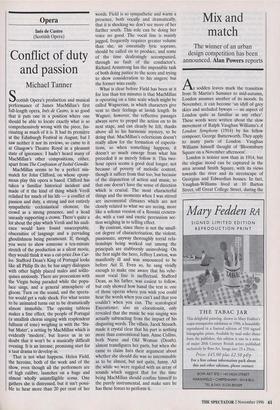Ope ra
Ines de Castro (Scottish Opera)
Conflict of duty and passion
Michael Tanner
Scottish Opera's production and musical performance of James MacMillan's first full-length opera, Ines de Castro, is so good that it puts one in a position where one should be able to locate exactly what is so comprehensively wrong with the piece, fas- cinating as much of it is. It had its premiere at the Edinburgh Festival in August, but I saw neither it nor its reviews, so came to it at Glasgow's Theatre Royal in a pleasant state of ignorance. I hadn't heard many of MacMillan's other compositions, either, apart from The Confession of Isobel Gowdie.
MacMillan seems to be a perfect mis- match for John Clifford, on whose epony- mous play this opera is based. Clifford has taken a familiar historical incident and made of it the kind of thing which Verdi relished for much of his life — a conflict of passion and duty, a strong and not entirely sympathetic ecclesiastical element, the crowd as a strong presence, and a head uneasily supporting a crown. There's quite a lot about the play which Verdi and his audi- ence would have found unacceptable, obscenities of language and a pervading ghoulishness being paramount. If, though, you were to show someone a ten-minute stretch of the production as a silent movie, they would think it was a cut-price Don Car- los. Stafford Dean's King of Portugal looks like all Philip Its do; he has angry dialogues with other highly placed males and solilo- quises anxiously. There are processions with the Virgin being paraded while the popu- lace sings, and a general atmosphere of gloom. Turn on the sound, and the specta- tor would get a rude shock. For what seems to be animated turns out to be dramatically almost immobile. The opening tableau makes a fine effect, the people of Portugal (a smallish chorus singing with resplendent fullness of tone) weighing in with the `Sta- bat Mater', a setting by MacMillan which is evidently 'modern', but leaves us in no doubt that it won't be a musically difficult evening. It is an intense, promising start for a taut drama to develop in.
That is not what happens. Helen Field, the heroine, both of the work and of the show, even though all the performers are of high calibre, launches on a huge and almost wholly unintelligible scena. One gathers she is distressed, but it isn't possi- ble to hear more than 20 per cent of her words. Field is so sympathetic and warm a presence, both vocally and dramatically, that it is shocking we don't see more of her further south. This role can be doing her voice no good. The vocal line is mainly jagged, frequently requires greater volume than she, an essentially lyric soprano, should be called on to produce, and some of the time deafeningly accompanied, through no fault of the conductor's. Richard Armstrong has the impossible task of both doing justice to the score and trying to show consideration to his singers; but the former wins easily.
What is clear before Field has been at it for less than ten minutes is that MacMillan is operating on a time scale which might be called Wagnerian, in which characters give vent to their feelings at lavish length. In Wagner, however, the reflective passages always serve to propel the action on to its next stage, and can clearly be felt, thanks above all to his harmonic mystery, to be doing that. MacMillan's eclecticism doesn't really allow for the formation of expecta- tions, so when something happens, it doesn't so much emerge from what has preceded it as merely follow it. This two- hour opera seems a good deal longer, not because of poverty of melodic content, though it suffers from that too, but because of the disjunction of action and music, so that one doesn't have the sense of direction which is crucial. The most characterful things and the moments when I was stirred are incremental climaxes which are not closely related to what we are seeing, more like a solemn version of a Rossini crescen- do, with a vast and exotic percussion sec- tion weighing in to telling effect.
By contrast, since there is not the small- est degree of characterisation, the violent, passionate, anyway thoroughly torrid rela- tionships being worked out among the principals are stubbornly uninvolving. On the first night the hero, Jeffrey Lawton, was manifestly ill and was announced to be before Act II. Even so, he sang vividly enough to make one aware that his vehe- ment vocal line is ineffectual. Stafford Dean, as his father, was easiest to follow, but only showed how banal the text is: one of those operas where you wish you could hear the words when you can't and that you couldn't when you can. The scatological Executioner, also an elocutionist, only revealed that the music he was singing was actually subtracting from the impact of his disgusting words. The villain, Jacek Strauch, made it crystal clear that his part is nothing more than conventional ham. Anne Collins, both Nurse and Old Woman (Death), almost transfigures her parts, but when she came to claim Ines their argument about whether she should die was so interminable as to be almost, but not quite, funny. All the while we were regaled with an array of sounds which suggest that for the time being MacMillan should confine himself to the purely instrumental, and make sure he has these forces to perform it.


















































































 Previous page
Previous page